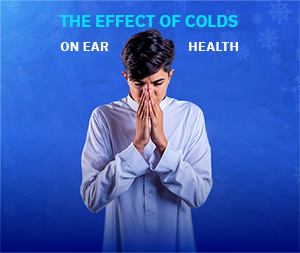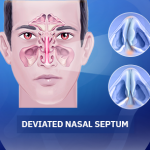Ear Health
Ear health deserves special attention during the winter season, as dropping temperatures can pose a direct threat to the well-being of the ears.
Exposure to extreme cold may lead to various ear problems, including middle ear infections, cold sensitivity, or tinnitus. In this article, we will explore how cold weather affects ear health and raise awareness about essential preventive and care strategies that are vital for maintaining ear safety during winter.

- Ear Problems Related to the Common Cold
- The Impact of Colds on Ear Health
- The Effect of Cold Weather on Tinnitus
- How Cold Weather Influences Earwax Hardening
- How to Maintain Ear Health in Winter
Ear Problems Associated with the Common Cold
Ear health can be directly impacted when an individual catches a cold, as several issues may arise due to physiological changes in the body—particularly involving the Eustachian tube, which connects the middle ear to the throat. During a cold, mucus and viruses accumulate in the nasal passages, leading to blockage of this tube.
This blockage disrupts normal airflow within the ear and causes fluid to build up in the middle ear. As a result, individuals may experience pain and a sensation of fullness. If the fluid accumulation persists, it can create an ideal environment for bacterial growth, potentially leading to a middle ear infection. This condition is often accompanied by severe pain, hearing difficulties, ear swelling, and additional symptoms such as green or yellow nasal discharge and fever.
The Impact of Colds on Ear Health
Ear pain is one of the most common symptoms that accompany colds and flu, and it can significantly compromise ear health. Many individuals experience this type of pain alongside other cold-related symptoms such as coughing and nasal discharge.
Several factors contribute to the onset of ear pain during a cold, including:
Eardrum Inflammation:
One of the most frequent causes of ear pain is inflammation of the eardrum. Cold-causing viruses may directly affect the eardrum, leading to inflammation. This results in mild to sharp pain, sometimes accompanied by a burning sensation. However, the discomfort typically subsides once the cold resolves.
Congestion and Increased Ear Pressure:
Mucus buildup in the nasal passages can block the Eustachian tube, making it difficult to equalize ear pressure. This obstruction leads to fluid accumulation in the middle ear, causing pain, hearing loss, and a feeling of fullness or congestion.
Middle Ear Infection:
If fluid continues to collect in the middle ear due to persistent Eustachian tube blockage, it may progress into a middle ear infection. The stagnant fluid creates a breeding ground for bacteria and viruses, resulting in inflammation, severe ear pain, and hearing difficulties.
Sinusitis:
If a cold is not properly treated, it may develop into sinusitis. This condition causes fluid buildup and increased pressure in the sinuses, which can radiate to the ears. The pressure leads to ear pain and intensifies other symptoms such as nasal congestion, facial pain, nasal blockage, breathing difficulties, toothache, frontal headaches, coughing, and fever.
The Effect of Cold Weather on Tinnitus
Tinnitus is a bothersome condition that may become more intense in cold weather, potentially affecting ear health. This increase in severity is primarily due to changes in blood circulation when the body is exposed to cold temperatures. In low temperatures, the body prioritizes supplying oxygen and warmth to vital internal organs, which leads to reduced blood flow to the extremities, including the ears and nose.
As blood flow to the ears decreases, the oxygen levels within the ear tissues drop, which can intensify the perception of tinnitus. Consequently, the sounds a person hears may become less clear and more irritating.
For individuals with tinnitus, it is advisable to take precautions against cold exposure by wearing insulated hats or scarves to maintain ear warmth and prevent the negative impact of cold weather.
The Effect of Cold Weather on Earwax Hardening
Cold weather has a direct impact on earwax, as dropping temperatures can cause the wax to harden and accumulate within the ear canal. In some cases, this hardening leads to ear blockage, resulting in symptoms such as pain, a sensation of fullness in the ear, hearing loss, and sometimes accompanied by tinnitus, dizziness, or headaches.
To manage hardened earwax, the following measures are recommended:
Avoid Cotton Swabs: Using cotton swabs may push the wax deeper into the ear canal, worsening the blockage.
Steam Inhalation: Inhaling steam can help soften the hardened wax, facilitate drainage of trapped fluids, and reduce ear irritation.
Consult an ENT Specialist: A visit to an ear, nose, and throat (ENT) doctor is advised for professional earwax removal and appropriate management of this uncomfortable condition.
The Impact of Cold Weather on the Sinuses
Cold winter weather can significantly affect the sinuses by irritating the mucous membranes that line them. When the body is exposed to cold temperatures, the blood vessels in the nose constrict, reducing blood flow to the area and increasing inflammation. Additionally, the drop in temperature thickens mucus, making it more difficult to drain from the sinuses. This leads to a sensation of pressure or pain, particularly in the forehead and nasal regions.
Individuals with chronic sinusitis often notice a worsening of their symptoms during winter, as vasoconstriction reduces blood circulation, weakens immune response, and increases the body’s susceptibility to infections. These effects are most noticeable through symptoms such as nasal congestion, headaches, and difficulty breathing through the nose.
How to Maintain Ear Health During Winter
To protect your ears from the effects of cold weather during winter, several simple preventive measures can be followed:
Wear Hats and Scarves: Keeping your ears warm with hats or scarves helps shield them from cold winds that may cause pain or inflammation.
Use Humidifiers: Maintaining optimal indoor humidity reduces ear dryness and irritation.
Clean Ears Safely and Regularly: Ensure ear hygiene by cleaning them safely without using sharp objects. If wax buildup becomes an issue, consult a healthcare professional for proper earwax removal.
Avoid Sudden Temperature Changes: Moving abruptly between cold outdoor and warm indoor environments can increase ear pressure and discomfort.
In conclusion, it is essential to prioritize ear health—especially during the winter season. Cold weather can exacerbate various ear problems, whether related to colds, tinnitus, hardened earwax, or different types of ear infections. If you experience any unusual symptoms such as persistent pain, bothersome pulsating tinnitus, or hearing loss, it is strongly recommended to consult an ear, nose, and throat (ENT) specialist for a proper evaluation and appropriate treatment.






